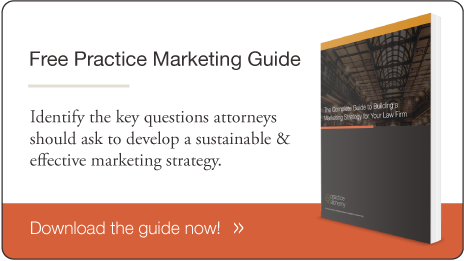You have no idea how your website works. You still flinch every time you see your name online. You’re not sure what your LinkedIn password is. And you’re still using that 13-year-old headshot.
Think that’s the best way to grow your practice?
As a lawyer, it’s easy to forget or even ignore your online presence. Especially when you don’t understand its impact on your law practice and your personal brand.
For some practice areas, like DUI, the online presence is a critical piece of the puzzle. For a few, you can get by with a so-so strategy. But for most, you're underestimating it.
But you won’t know how many opportunities you’re leaving on the table if you don’t pay attention to this aspect.
Some vendors will “sell” you an online presence for an exorbitant sum of money.
What they’re promising to deliver may have been an enormous, technically complex undertaking 20, or even 10, years ago.
Sure, there’s an art and science to building an effective website. But it’s nowhere near as complicated or difficult as it used to be.
That means it also shouldn’t be as expensive.
But these vendors are sustaining an entire predatory industry on the legal profession because most lawyers have no idea how ridiculously easy it is to build a website.
Most Lawyers Aren’t Technically Trained or Savvy.
As a result, the whole online universe may seem scary. Foreign. Overwhelming.
So we ignore it.
Related: Email Marketing for Lawyers (Explained Like You’re Five)
When lawyers get their information online, it usually comes from articles in legal publications.
What is Avvo? Is it useful for me? Should I have my online presence through Martindale or one of the other big names?
Other than Avvo, which is relatively new, most lawyers are thinking along the lines of Martindale or LexisNexis.
Why?
Because lawyers are precedent-driven. So they look to the people who created paper directories from the last century to help create a modern online strategy.
But guess what, the paper behemoths of yesterday are trying to prop up their decaying finances on the print side by overcharging you for (now inexpensively created) web materials.
Where’s Lawyer Marketing Headed?
The gap between the successful and the dying is wider than ever.
According to the Glass Half Full report, law firm partners earned about $173,000 in 1967. Solo practitioners earned about $75,000. Those numbers are adjusted for inflation.
In 2012, mid-size law firm partner income more than doubled to $349,000. Solo practitioner income dropped 34 percent to about $49,000.
Related: What I Learned About the Future of Law Practice Marketing Talking To 527 Lawyers This Year
A big reason for that widening gap in earnings is the equally large knowledge gap.
Just like an attorney can charge a premium for specialized knowledge, there’s a painfully expensive knowledge tax for not understanding marketing.
The less you understand, the higher that tax gets.
You Have to Be Knowledgeable. But You Don’t Have to Be an Expert.
You need a basic understanding of online marketing. How a website works. The importance of LinkedIn.
You also have to understand the minimum investment you need to make if you expect to see any meaningful results. If you’re spending any less than that minimum, you’re basically throwing your money away.
So you need knowledge, but it’s unrealistic to expect a practicing attorney to become an online marketing expert.
You just need to know enough to be able to delegate to experts and evaluate your options.
These articles can help you acquire that knowledge by learning:
- How to Maintain Your Referral Network
- How to Position Your Law Firm
- How to Become an Authority
- The 7 Traits of Successful Law Firms
- 5 Common LinkedIn Mistakes


 4 mins
4 mins
